市场营销 Marketing
- 格式:ppt
- 大小:2.42 MB
- 文档页数:24
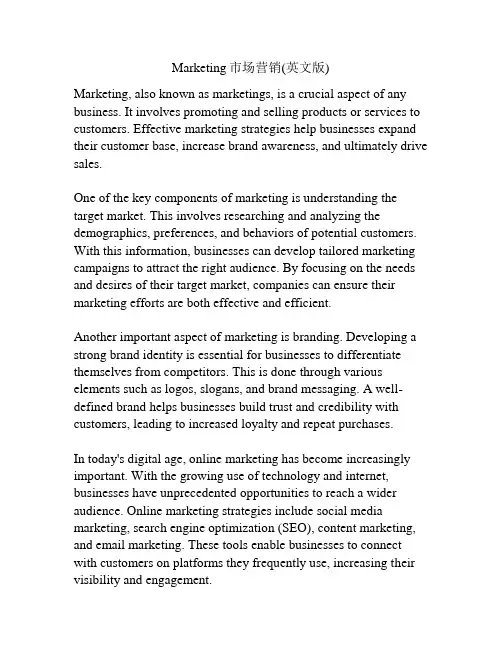
Marketing市场营销(英文版)Marketing, also known as marketings, is a crucial aspect of any business. It involves promoting and selling products or services to customers. Effective marketing strategies help businesses expand their customer base, increase brand awareness, and ultimately drive sales.One of the key components of marketing is understanding the target market. This involves researching and analyzing the demographics, preferences, and behaviors of potential customers. With this information, businesses can develop tailored marketing campaigns to attract the right audience. By focusing on the needs and desires of their target market, companies can ensure their marketing efforts are both effective and efficient.Another important aspect of marketing is branding. Developing a strong brand identity is essential for businesses to differentiate themselves from competitors. This is done through various elements such as logos, slogans, and brand messaging. A well-defined brand helps businesses build trust and credibility with customers, leading to increased loyalty and repeat purchases.In today's digital age, online marketing has become increasingly important. With the growing use of technology and internet, businesses have unprecedented opportunities to reach a wider audience. Online marketing strategies include social media marketing, search engine optimization (SEO), content marketing, and email marketing. These tools enable businesses to connect with customers on platforms they frequently use, increasing their visibility and engagement.Another effective marketing technique is influencer marketing.This involves collaborating with influential individuals, such as celebrities or social media personalities, to promote products or services. By leveraging the popularity and credibility of these influencers, businesses can reach a larger audience and gain credibility and trust from their followers.Marketing also involves analyzing and measuring the effectiveness of marketing campaigns. This is done through metrics such as return on investment (ROI), customer acquisition cost (CAC), and customer lifetime value (CLTV). By tracking these metrics, businesses can evaluate the success of their marketing efforts and make any necessary adjustments to optimize their strategies.In conclusion, marketing plays a vital role in business success. It helps businesses understand their target market, build strong brands, and reach a wider audience through various channels. By implementing effective marketing strategies, businesses can increase their customer base, boost brand awareness, and ultimately drive sales.在一个竞争激烈的商业环境中,有效的营销策略是企业取得成功的关键。
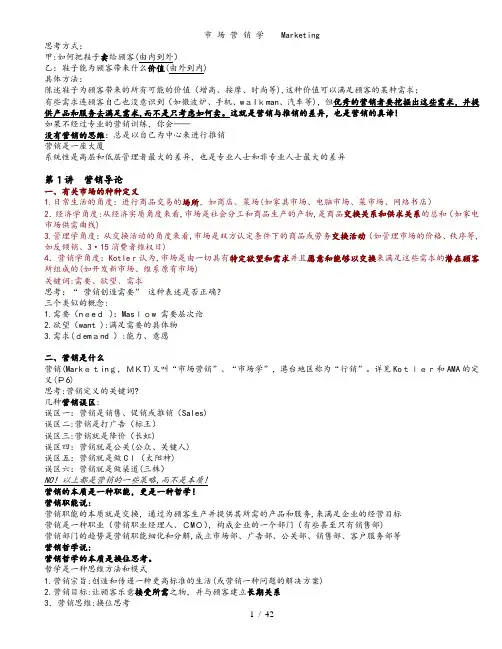
甲:如何把鞋子卖给顾客(由内到外)乙:鞋子能为顾客带来什么价值(由外到内)具体方法:陈述鞋子为顾客带来的所有可能的价值(增高、按摩、时尚等),这种价值可以满足顾客的某种需求;有些需求连顾客自己也没意识到(如微波炉、手机、walkman、汽车等),但优秀的营销者要挖掘出这些需求,并提供产品和服务去满足需求,而不是只考虑如何卖。
这就是营销与推销的差异,也是营销的真谛!如果不经过专业的营销训练,你会——没有营销的思维:总是以自己为中心来进行推销营销是一座大厦系统性是高层和低层管理者最大的差异,也是专业人士和非专业人士最大的差异第1讲营销导论一、有关市场的种种定义1.日常生活的角度:进行商品交易的场所,如商店、菜场(如家具市场、电脑市场、菜市场、网络书店)2.经济学角度:从经济实质角度来看,市场是社会分工和商品生产的产物,是商品交换关系和供求关系的总和(如家电市场供需曲线)3.管理学角度:从交换活动的角度来看,市场是双方认定条件下的商品或劳务交换活动(如管理市场的价格、秩序等,如反倾销、3·15消费者维权日)4.营销学角度:Kotler认为,市场是由一切具有特定欲望和需求并且愿意和能够以交换来满足这些需求的潜在顾客所组成的(如开发新市场、维系原有市场)关键词:需要、欲望、需求思考:“ 营销创造需要” 这种表述是否正确?三个类似的概念:1.需要(need):Maslow 需要层次论2.欲望(want ):满足需要的具体物3.需求(demand ):能力、意愿二、营销是什么营销(Marketing, MKT)又叫“市场营销”、“市场学”,港台地区称为“行销”。
详见Kotler和AMA的定义(P6)思考:营销定义的关键词?几种营销误区:误区一:营销是销售、促销或推销(Sales)误区二:营销是打广告(标王)误区三:营销就是降价(长虹)误区四:营销就是公关(公众、关键人)误区五:营销就是做CI(太阳神)误区六:营销就是做渠道(三株)NO!以上都是营销的一些策略,而不是本质!营销的本质是一种职能,更是一种哲学!营销职能说:营销职能的本质就是交换,通过为顾客生产并提供其所需的产品和服务,来满足企业的经营目标营销是一种职业(营销职业经理人、CMO),构成企业的一个部门(有些甚至只有销售部)营销部门的趋势是营销职能细化和分解,成立市场部、广告部、公关部、销售部、客户服务部等营销哲学说:营销哲学的本质是换位思考。
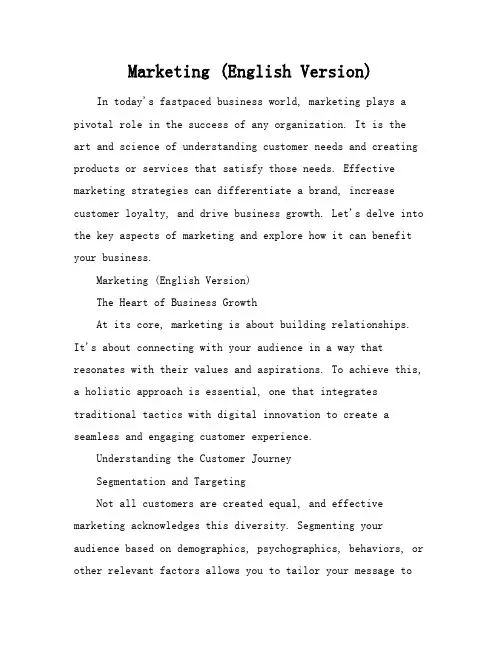
Marketing (English Version) In today's fastpaced business world, marketing plays a pivotal role in the success of any organization. It is theart and science of understanding customer needs and creating products or services that satisfy those needs. Effective marketing strategies can differentiate a brand, increase customer loyalty, and drive business growth. Let's delve into the key aspects of marketing and explore how it can benefit your business.Marketing (English Version)The Heart of Business GrowthAt its core, marketing is about building relationships.It's about connecting with your audience in a way that resonates with their values and aspirations. To achieve this, a holistic approach is essential, one that integrates traditional tactics with digital innovation to create a seamless and engaging customer experience.Understanding the Customer JourneySegmentation and TargetingNot all customers are created equal, and effective marketing acknowledges this diversity. Segmenting your audience based on demographics, psychographics, behaviors, or other relevant factors allows you to tailor your message todifferent groups. This targeted approach ensures that your marketing efforts are more relevant and, consequently, more effective.The Power of StorytellingStories are a universal language that can evoke emotions and create lasting memories. In marketing, storytelling is a powerful tool that can humanize your brand and make it more relatable. By crafting narratives that align with yourbrand's values and mission, you can forge a deeper connection with your audience and inspire them to take action.Leveraging Digital ChannelsMeasuring SuccessMarketing is an investment, and like any investment, it needs to be measured for return. Key performance indicators (KPIs) such as conversion rates, customer acquisition costs, and customer lifetime value provide a clear picture of your marketing efforts' effectiveness. By analyzing these metrics, you can refine your strategies, optimize your budget, and ensure that your marketing activities contribute to your business's bottom line.Continuous ImprovementMarketing (English Version)The Art of Persuasion and EngagementThe essence of marketing lies in its ability to persuade and engage. It's not just about selling products; it's about selling an experience, a lifestyle, and a vision. Here's how businesses can harness the full potential of marketing to achieve their goals.Crafting a Compelling Brand IdentityInfluencing Consumer BehaviorUnderstanding the psychology behind consumer behavior is crucial for marketers. By identifying the triggers that lead to purchasing decisions, you can design campaigns that nudge potential customers towards conversion. This involves not only the rational aspects of product features and benefits but also the emotional appeal that can often be the deciding factor in a consumer's choice.The Role of Content MarketingContent marketing is the strategic creation and distribution of valuable, relevant, and consistent content to attract and retain a clearly defined audience. It's about educating your customers, entertaining them, and providing solutions to their problems. From blog posts to videos, infographics to podcasts, highquality content can establish your brand as an authority in your industry and build trust with your audience.Collaborating with InfluencersCustomer Engagement and Retention Ethical Marketing Practices。
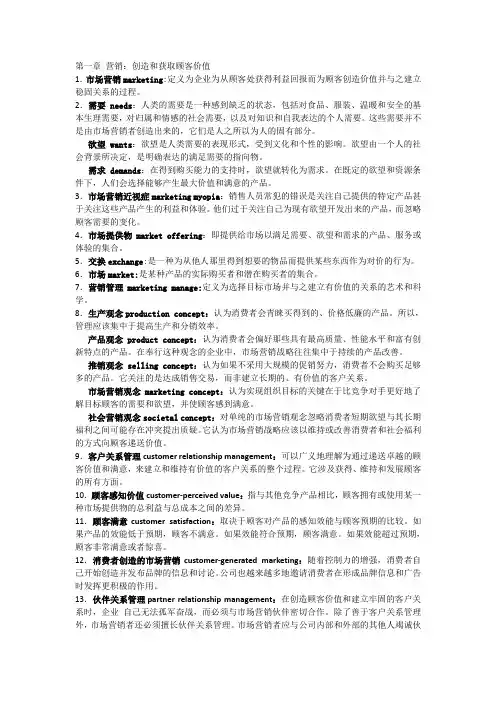
第一章营销:创造和获取顾客价值1.市场营销marketing:定义为企业为从顾客处获得利益回报而为顾客创造价值并与之建立稳固关系的过程。
2.需要needs:人类的需要是一种感到缺乏的状态,包括对食品、服装、温暖和安全的基本生理需要,对归属和情感的社会需要,以及对知识和自我表达的个人需要。
这些需要并不是由市场营销者创造出来的,它们是人之所以为人的固有部分。
欲望wants:欲望是人类需要的表现形式,受到文化和个性的影响。
欲望由一个人的社会背景所决定,是明确表达的满足需要的指向物。
需求demands:在得到购买能力的支持时,欲望就转化为需求。
在既定的欲望和资源条件下,人们会选择能够产生最大价值和满意的产品。
3.市场营销近视症marketing myopia:销售人员常犯的错误是关注自己提供的特定产品甚于关注这些产品产生的利益和体验。
他们过于关注自己为现有欲望开发出来的产品,而忽略顾客需要的变化。
4.市场提供物market offering:即提供给市场以满足需要、欲望和需求的产品、服务或体验的集合。
5.交换exchange:是一种为从他人那里得到想要的物品而提供某些东西作为对价的行为。
6.市场market:是某种产品的实际购买者和潜在购买者的集合。
7.营销管理marketing manage:定义为选择目标市场并与之建立有价值的关系的艺术和科学。
8.生产观念production concept:认为消费者会青睐买得到的、价格低廉的产品。
所以,管理应该集中于提高生产和分销效率。
产品观念product concept:认为消费者会偏好那些具有最高质量、性能水平和富有创新特点的产品。
在奉行这种观念的企业中,市场营销战略往往集中于持续的产品改善。
推销观念selling concept:认为如果不采用大规模的促销努力,消费者不会购买足够多的产品。
它关注的是达成销售交易,而非建立长期的、有价值的客户关系。
市场营销观念marketing concept:认为实现组织目标的关键在于比竞争对手更好地了解目标顾客的需要和欲望,并使顾客感到满意。
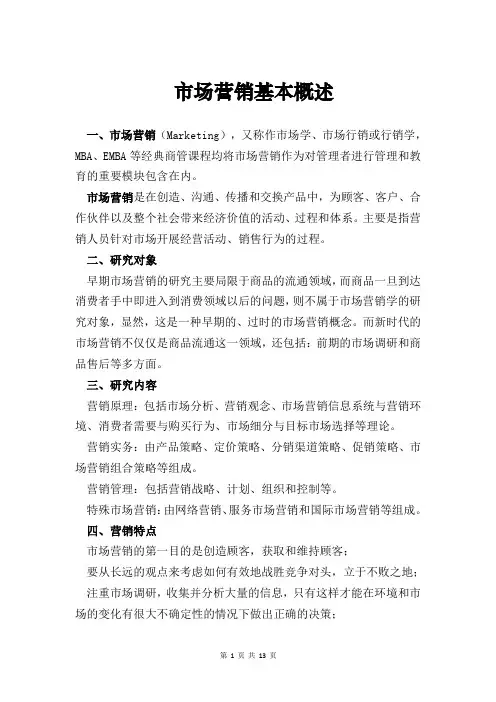
市场营销基本概述一、市场营销(Marketing),又称作市场学、市场行销或行销学,MBA、EMBA等经典商管课程均将市场营销作为对管理者进行管理和教育的重要模块包含在内。
市场营销是在创造、沟通、传播和交换产品中,为顾客、客户、合作伙伴以及整个社会带来经济价值的活动、过程和体系。
主要是指营销人员针对市场开展经营活动、销售行为的过程。
二、研究对象早期市场营销的研究主要局限于商品的流通领域,而商品一旦到达消费者手中即进入到消费领域以后的问题,则不属于市场营销学的研究对象,显然,这是一种早期的、过时的市场营销概念。
而新时代的市场营销不仅仅是商品流通这一领域,还包括:前期的市场调研和商品售后等多方面。
三、研究内容营销原理:包括市场分析、营销观念、市场营销信息系统与营销环境、消费者需要与购买行为、市场细分与目标市场选择等理论。
营销实务:由产品策略、定价策略、分销渠道策略、促销策略、市场营销组合策略等组成。
营销管理:包括营销战略、计划、组织和控制等。
特殊市场营销:由网络营销、服务市场营销和国际市场营销等组成。
四、营销特点市场营销的第一目的是创造顾客,获取和维持顾客;要从长远的观点来考虑如何有效地战胜竞争对头,立于不败之地;注重市场调研,收集并分析大量的信息,只有这样才能在环境和市场的变化有很大不确定性的情况下做出正确的决策;积极推行革新,其程度与效果成正比;在变化中进行决策,要求其决策者要有很强的能力,要有像企业家一样的洞察力、识别力和决断力。
五、营销步骤1、分析市场机会2、选择目标市场3、确定市场营销策略4、市场营销活动管理(1)市场营销计划。
既要制定较长期战略规划,决定企业的发展方向和目标,又要有具体的市场营销计划,具体实施战略计划目标。
(2)市场营销组织。
营销计划需要有一个强有力的营销组织来执行。
根据计划目标,需要组建一个高效的营销组织结构,需要对组织人员实施筛选、培训、激励和评估等一系列管理活动。
(3)市场营销控制。
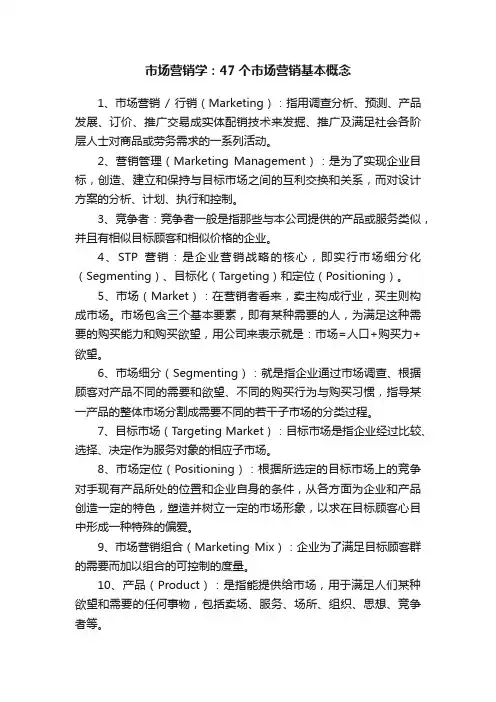
市场营销学:47个市场营销基本概念1、市场营销/ 行销(Marketing):指用调查分析、预测、产品发展、订价、推广交易成实体配销技术来发掘、推广及满足社会各阶层人士对商品或劳务需求的一系列活动。
2、营销管理(Marketing Management):是为了实现企业目标,创造、建立和保持与目标市场之间的互利交换和关系,而对设计方案的分析、计划、执行和控制。
3、竞争者:竞争者一般是指那些与本公司提供的产品或服务类似,并且有相似目标顾客和相似价格的企业。
4、STP营销:是企业营销战略的核心,即实行市场细分化(Segmenting)、目标化(Targeting)和定位(Positioning)。
5、市场(Market):在营销者看来,卖主构成行业,买主则构成市场。
市场包含三个基本要素,即有某种需要的人,为满足这种需要的购买能力和购买欲望,用公司来表示就是:市场=人口+购买力+欲望。
6、市场细分(Segmenting):就是指企业通过市场调查、根据顾客对产品不同的需要和欲望、不同的购买行为与购买习惯,指导某一产品的整体市场分割成需要不同的若干子市场的分类过程。
7、目标市场(Targeting Market):目标市场是指企业经过比较、选择、决定作为服务对象的相应子市场。
8、市场定位(Positioning):根据所选定的目标市场上的竞争对手现有产品所处的位置和企业自身的条件,从各方面为企业和产品创造一定的特色,塑造并树立一定的市场形象,以求在目标顾客心目中形成一种特殊的偏爱。
9、市场营销组合(Marketing Mix):企业为了满足目标顾客群的需要而加以组合的可控制的度量。
10、产品(Product):是指能提供给市场,用于满足人们某种欲望和需要的任何事物,包括卖场、服务、场所、组织、思想、竞争者等。
11、服务(Service):用于出售或者是同产品连在一起进行出售的活动、利益或满足感。
12、整体产品=核心产品+有形产品+附加产品13、核心产品(Core Product):是指消费者购买某种产品时所追求的利益,是顾客真正需要的东西。
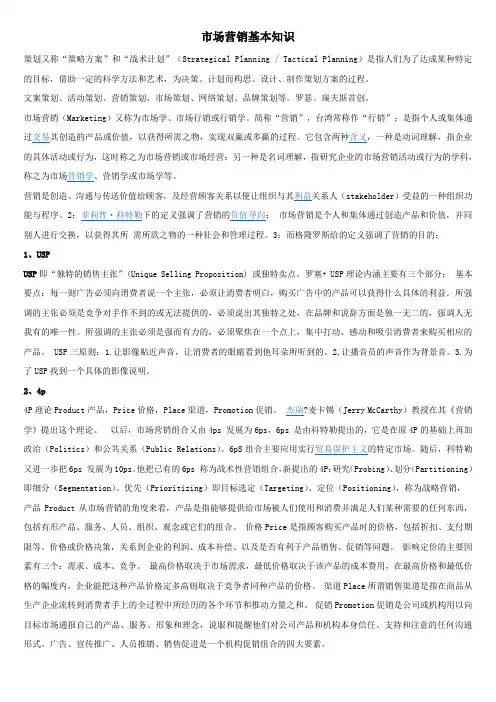
市场营销基本知识策划又称“策略方案”和“战术计划”(Strategical Planning / Tactical Planning)是指人们为了达成某种特定的目标,借助一定的科学方法和艺术,为决策、计划而构思、设计、制作策划方案的过程。
文案策划、活动策划、营销策划、市场策划、网络策划、品牌策划等。
罗瑟。
瑞夫斯首创。
市场营销(Marketing)又称为市场学、市场行销或行销学。
简称“营销”,台湾常称作“行销”;是指个人或集体通过交易其创造的产品或价值,以获得所需之物,实现双赢或多赢的过程。
它包含两种含义,一种是动词理解,指企业的具体活动或行为,这时称之为市场营销或市场经营;另一种是名词理解,指研究企业的市场营销活动或行为的学科,称之为市场营销学、营销学或市场学等。
营销是创造、沟通与传送价值给顾客,及经营顾客关系以便让组织与其利益关系人(stakeholder)受益的一种组织功能与程序。
2:菲利普·科特勒下的定义强调了营销的价值导向:市场营销是个人和集体通过创造产品和价值,并同别人进行交换,以获得其所需所欲之物的一种社会和管理过程。
3:而格隆罗斯给的定义强调了营销的目的:1、USPUSP即“独特的销售主张”(Unique Selling Proposition) 或独特卖点。
罗塞• USP理论内涵主要有三个部分;基本要点:每一则广告必须向消费者说一个主张,必须让消费者明白,购买广告中的产品可以获得什么具体的利益。
所强调的主张必须是竞争对手作不到的或无法提供的,必须说出其独特之处,在品牌和说辞方面是独一无二的,强调人无我有的唯一性。
所强调的主张必须是强而有力的,必须聚焦在一个点上,集中打动、感动和吸引消费者来购买相应的产品。
USP三原则:1.让影像贴近声音,让消费者的眼睛看到他耳朵所听到的。
2,让播音员的声音作为背景音。
3.为了USP找到一个具体的影像说明。
2、4p4P理论Product产品,Price价格,Place渠道,Promotion促销。
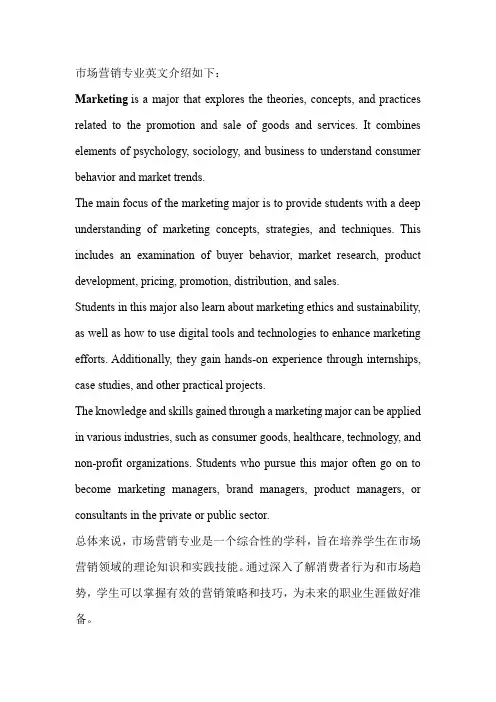
市场营销专业英文介绍如下:Marketing is a major that explores the theories, concepts, and practices related to the promotion and sale of goods and services. It combines elements of psychology, sociology, and business to understand consumer behavior and market trends.The main focus of the marketing major is to provide students with a deep understanding of marketing concepts, strategies, and techniques. This includes an examination of buyer behavior, market research, product development, pricing, promotion, distribution, and sales.Students in this major also learn about marketing ethics and sustainability, as well as how to use digital tools and technologies to enhance marketing efforts. Additionally, they gain hands-on experience through internships, case studies, and other practical projects.The knowledge and skills gained through a marketing major can be applied in various industries, such as consumer goods, healthcare, technology, and non-profit organizations. Students who pursue this major often go on to become marketing managers, brand managers, product managers, or consultants in the private or public sector.总体来说,市场营销专业是一个综合性的学科,旨在培养学生在市场营销领域的理论知识和实践技能。
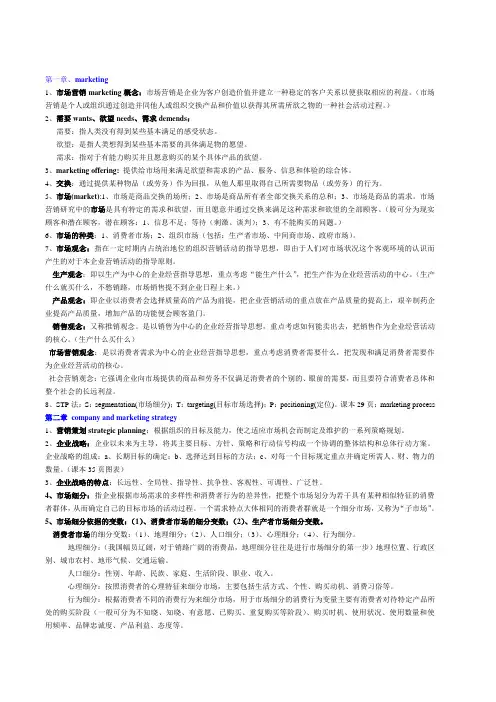
第一章、marketing1、市场营销marketing概念:市场营销是企业为客户创造价值并建立一种稳定的客户关系以便获取相应的利益。
(市场营销是个人或组织通过创造并同他人或组织交换产品和价值以获得其所需所欲之物的一种社会活动过程。
)2、需要wants、欲望needs、需求demends:需要:指人类没有得到某些基本满足的感受状态。
欲望:是指人类想得到某些基本需要的具体满足物的愿望。
需求:指对于有能力购买并且愿意购买的某个具体产品的欲望。
3、marketing offering:提供给市场用来满足欲望和需求的产品、服务、信息和体验的综合体。
4、交换:通过提供某种物品(或劳务)作为回报,从他人那里取得自己所需要物品(或劳务)的行为。
5、市场(market):1、市场是商品交换的场所;2、市场是商品所有者全部交换关系的总和;3、市场是商品的需求。
市场营销研究中的市场是具有特定的需求和欲望,而且愿意并通过交换来满足这种需求和欲望的全部顾客。
(股可分为现实顾客和潜在顾客,潜在顾客:1、信息不足;等待(刺激、谈判);3、有不能购买的问题。
)6、市场的种类:1、消费者市场;2、组织市场(包括:生产者市场、中间商市场、政府市场)。
7、市场观念:指在一定时期内占统治地位的组织营销活动的指导思想,即由于人们对市场状况这个客观环境的认识而产生的对于本企业营销活动的指导原则。
生产观念:即以生产为中心的企业经营指导思想,重点考虑“能生产什么”,把生产作为企业经营活动的中心。
(生产什么就买什么,不愁销路,市场销售提不到企业日程上来。
)产品观念:即企业以消费者会选择质量高的产品为前提,把企业营销活动的重点放在产品质量的提高上,艰辛制药企业提高产品质量,增加产品的功能便会顾客盈门。
销售观念:又称推销观念。
是以销售为中心的企业经营指导思想,重点考虑如何能卖出去,把销售作为企业经营活动的核心。
(生产什么买什么)市场营销观念:是以消费者需求为中心的企业经营指导思想,重点考虑消费者需要什么,把发现和满足消费者需要作为企业经营活动的核心。
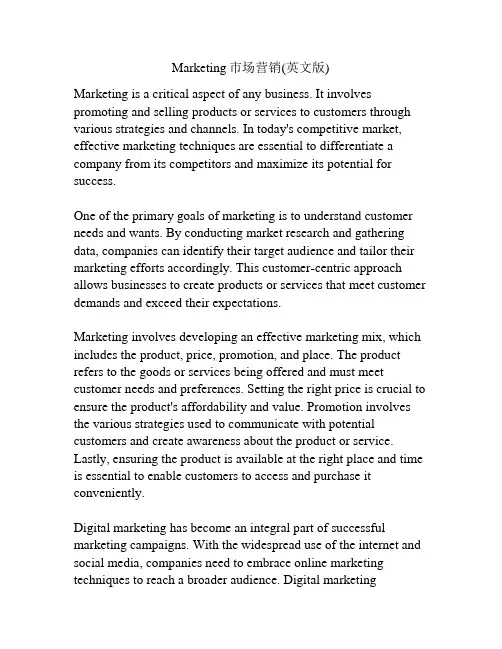
Marketing市场营销(英文版)Marketing is a critical aspect of any business. It involves promoting and selling products or services to customers through various strategies and channels. In today's competitive market, effective marketing techniques are essential to differentiate a company from its competitors and maximize its potential for success.One of the primary goals of marketing is to understand customer needs and wants. By conducting market research and gathering data, companies can identify their target audience and tailor their marketing efforts accordingly. This customer-centric approach allows businesses to create products or services that meet customer demands and exceed their expectations.Marketing involves developing an effective marketing mix, which includes the product, price, promotion, and place. The product refers to the goods or services being offered and must meet customer needs and preferences. Setting the right price is crucial to ensure the product's affordability and value. Promotion involves the various strategies used to communicate with potential customers and create awareness about the product or service. Lastly, ensuring the product is available at the right place and time is essential to enable customers to access and purchase it conveniently.Digital marketing has become an integral part of successful marketing campaigns. With the widespread use of the internet and social media, companies need to embrace online marketing techniques to reach a broader audience. Digital marketingstrategies include search engine optimization (SEO), content marketing, social media advertising, email marketing, and influencer marketing. These methods help businesses connect with potential customers, increase brand visibility, and generate leads.Another critical aspect of marketing is building and maintaining strong customer relationships. Customer relationship management (CRM) is a strategy that helps companies track and analyze customer interactions to improve their overall experience. By understanding customer preferences, addressing their concerns, and providing excellent customer service, companies can build loyalty and retain customers in the long run.In today's fast-paced and highly competitive market, companies need to stay ahead of their competitors by continuously enhancing their marketing strategies. This requires staying updated with the latest marketing trends and technologies, monitoring competitor activities, and adapting accordingly. Additionally, companies must be flexible and willing to adjust their marketing efforts as market conditions and customer preferences change.In conclusion, marketing plays a vital role in the success of any business. By understanding customer needs, developing an effective marketing mix, embracing digital marketing techniques, and building strong customer relationships, companies can maximize their potential and stay ahead of the competition. It is crucial for businesses to continuously improve their marketing strategies to remain relevant and meet the evolving demands of their target audience.继续发展相关主题-内容营销:内容营销是当下营销领域的一个重要策略。
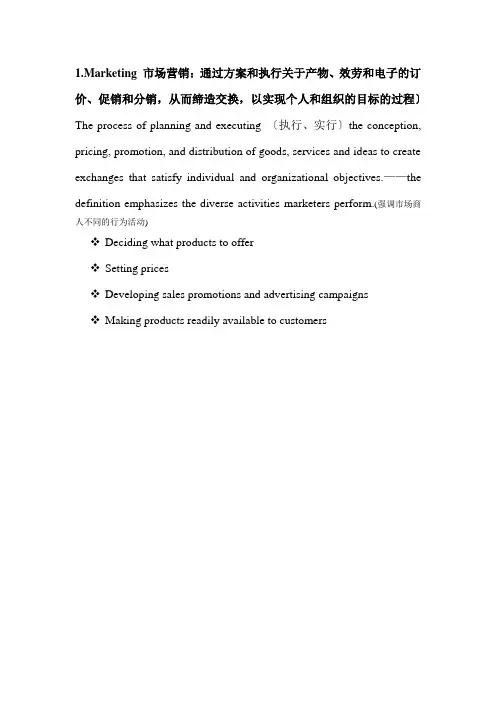
1.Marketing 市场营销:通过方案和执行关于产物、效劳和电子的订价、促销和分销,从而缔造交换,以实现个人和组织的目标的过程〕The process of planning and executing 〔执行、实行〕the conception, pricing, promotion, and distribution of goods, services and ideas to create exchanges that satisfy individual and organizational objectives.——the definition emphasizes the diverse activities marketers perform.(强调市场商人不同的行为活动)❖Deciding what products to offer❖Setting prices❖Developing sales promotions and advertising campaigns❖Making products readily available to customers2. The marketing Concepts(市场营销不雅念:企业阐发消费者需求,制定比竞争对后更好的决策来满足这些需求的哲学)❖The Production Concept 出产不雅念❖The Selling Concept 推销不雅念❖The Marketing Concept 市场营销不雅念The Production Concept 出产不雅念The idea that a firm should focus on those products that it could produce most efficiently and that the low-cost products would create the demand for those products.The Selling Concept / sales concept 推销不雅念(操纵广告这种重要方式来与其顾客沟通从而获取他们的订单)The Marketing Concept市场营销不雅念Difference between Selling and Marketing发卖与营销的区别3.The Marketing Mix / The 4P’s of Marketing市场营销组合1)Product〔产物:有形和无形,包罗包装、色彩、品牌、效劳,甚至发卖商的声誉〕Consumer products消费品:produced for and purchased byhouseholds for their use.Industrial products 工业产物:are sold primarily for use inproducing other products.2)Price〔价格:消费者为获得产物所必需支付的金额〕Refers to the value or worth of a product that attracts the buyer to exchange money or something of value for the product.Loss Leader Pricing(亏本出售商品〕selling things in its lower price than its cost price in order to attract customers to purchase the products.Penetration Pricing (渗透订价法---心理订价策略〕设定最初低价,以便迅速和深入地进入市场,从而快速吸引来大量的购置者,博得较大的市场份赖。
Marketing岗位的职责通常包括:
1. 制定营销策略和计划:根据公司的战略目标和市场需求,制定具体的营销策略和计划,包括品牌推广、产品推广、市场定位、市场细分、目标客户群体选择等。
2. 市场调研和分析:通过市场调研和分析,了解竞争对手情况和市场趋势,为营销策略的制定和调整提供依据。
3. 客户关系管理:建立和维护良好的客户关系,了解客户的需求和反馈,提高客户满意度和忠诚度。
4. 广告和宣传:负责广告和宣传活动的策划和实施,包括广告渠道的选择、广告文案的撰写、宣传活动的组织和推广等。
5. 销售促进:采取各种措施促进销售,包括销售渠道的开发、销售人员的培训和管理、销售数据的分析和反馈等。
6. 跨部门合作:与公司其他部门(如销售、产品、客服等)保持密切合作,共同推动营销活动的实施和效果的提升。
7. 报告和分析:定期提交营销活动的进展报告和效果分析,为公司的决策提供数据支持。
具体的岗位职责可能会因公司规模、行业、产品等因素而有所不同,以上职责仅供参考。
第一单元Marketing 市场营销定义:Marketing is the activity, set of institutions,and processes for creating,communicating, delivering, and exchanging offerings that have value for customers, clients,partners, and society at large.市场营销是在创造、沟通、传播和交换产品中,为顾客、客户、合作伙伴以及整个社会带来价值的一系列活动、过程和体系。
什么是市场营销计划:The marketing plan4个点:①situation analysis情况分析②marketing objectives 营销目标③target market selection目标市场选择④marketing mix市场营销组合课后单词:Blueprint 规划蓝图marketing mix 营销组合Competitive advantage 竞争优势marketing planning 营销计划Cross functional team 跨部门团队mortgage 抵押、抵押品Customer orientation 顾客导向organizational mission 组织使命Distinctive competencies 独特竞争力organizational objectives 组织目标Diversification 多样化战略organizational portfolio plan 资产组合计划Equilibrium 均衡Organizational strategies 组织战略Implementation 执行实施product development strategies 产品开发战略Line of products 产品系列production orientation 生产导向Market development strategies 市场开发战略selling orientation 销售导向Market penetration strategies 市场渗透战略situation analysis 形式分析Marketing Concept 营销观Strategic Business Units 战略事业单位Marketing information system 营销信息系统Strategic Planning 战略计划Marketing Management 营销管理第五单元market segmentation process市场细分的过程(市场定位过程)1、delineate firm's current situation(描绘公司的现状)2、Determine consumer needs and wants(确定消费者的需求和欲望)3、divide markets on relevant dimensions,(有关方面划分市场)4、develop product positioning,(开发产品定位)5、decide segmentation strategy, (决定细分策略)6、design marketing mix strategy(设计营销组合策略)P90第五单元单词:A priori segmentation 事前市场细分PRIZM 根据邮编制定的潜在市场等级指数Benefit Segmentation 利益细分product positioning; 产品定位geod emographic segmentation 地理人口细分Psychographic segmentation心理细分Market niche 市场缝隙segmentation dimension市场细分标准Positioning map 定位图target market 目标市场Market Segmentation 市场细分VALStm 价值观和生活方式系统Post hoc segmentation 事后市场细分第六单元:Product Line产品线(定义)= A set of products(一组产品)Product Mix产品组合(定义)= the full set of products(全套产品)103Product life cycle (产品生命周期)Introduction(产品介绍)growth (成长期)maturation(成熟期)decline(衰退期)第六单元单词Aesthetics 有美感line extension 产品线延伸Brand equity 品牌价值marketing myopia 市场缝隙Brand extension 品牌拓展multibranding 多品牌战略Conformance to specifications 规格一致performance 产品性能Cross functional teams 跨部门团队product adoption and diffusion 产品的采用和扩散Dual branding 双重品牌战略product audit 产品审核Durability 耐用性product life cycle 产品生命周期Extended product 延伸产品product line 产品系列Fad 热潮product line extension 产品系列延伸Family branding 家族品牌product mix 产品组合Fashion 时尚reliability 可靠性Franchise extension 特许经营权拓展serviceability 维护保养的方便性Generic product 一般产品tangible product 有形产品第八单元The promotion mix (促销组合)1、Advertising(广告)2、sales promotion(推销)3、public relations(公关)4、personal selling(个人推销;)Push versus pull marketing(推拉式营销)push strategies(推):involve aiming promotional efforts at distributors ,retailers,and sales personnel to gain their cooperation in ordering,stocking,and accelerating the sales of a product。
营销(marketing)与销售(sales)的区别屡屡见到对于“营销”和“销售”的具体区别和实质的探讨、争论,现就此作一下剖析,供大家讨论。
很多观点声称“销售过气”,“营销为王”,甚至对于营销还有“营销”和“行销”的功能性争论。
个人认为,既是同属“marketing”,营销和行销的实质应是一样的,都是为了更好的为顾客服务,扩大企业利益的职能部门称呼,还是要看不同地区或者不同企业所针对市场状况和组织结构建设的具体情况而定。
这个不算作讨论对象,还是回到营销与销售的话题上来。
其实,营销(marketing)和销售(sales)属于不同市场环境下的“市场营销”观念。
既不应简单的指斥“销售”的简单,也不应盲目崇拜“营销”的复杂;营销是销售的高级阶段,而销售是实施营销策略的必要手段。
没有销售,营销的各种策略就无法有效实施,营销也就变成了空中楼阁而显得苍白无力;反之,没有营销,那么,销售在现今的市场环境中,会浪费更多的资源,也没有针对性,无法达到更高的销售额以及销售利润。
只有二者联系得更加紧密,配合更加顺畅,才会使顾客需求、企业利润乃至社会利益得到最大满足。
一、销售和营销在观念上的区别既然要对二者作出比较,那就需要先对此二者观念的产生和含义作出解释。
销售和营销同属“市场营销哲学观念”,西方学者把市场营销管理哲学的演变划分为六个阶段:1,生产观念:在市场经济初步繁荣的时代,很多企业产品供不应求,品种、型号、规格甚至颜色较为单一,但对于消费者有极大地吸引力。
企业对生产过程不断改进,以求生产数量尽可能多、价格尽可能低,来满足人们对产品旺盛的需求。
所以,企业经营的重点在于扩大产能,降低价格;2,产品观念:在市场中出现了越来越多的同质化竞争者之后,企业对产品不断改良,认为只有更完美的产品才能获得更多的消费者的青睐;3,推销观念:买方市场由于企业产品质量提高、产能不断扩大而形成。
此时,企业为了抢占更多的市场份额和利润,自然希望销售掉更多的产品,于是,“推销观念”就此形成。
市场营销理论内容基本简介市场营销的涵义经济学家定义:市场营销是帮助消费者购买某种产品或劳务,从而使双方利益都得到满足的一种社会管理过程。
——American Marketing Association(1985)市场营销是指企业的这种职能,认识目前未满足的需要和欲望,估量和确定需求量大小,选择和决定企业能最好地为其服务的目标市场,并决定适当的产品,劳务和计划(或方案),以便为目标市场服务。
—— Philip Kotler(1984)相关专家认为可以从几个方面理解市场营销的涵义:第一、市场营销分为宏观和微观两个层次。
宏观市场营销是反映社会的经济活动,其目的是满足社会需要,实现社会目标。
微观市场营销是一种企业的经济活动过程,它是根据目标顾客的要求,生产适销对路的产品,从生产者流转到目标顾客,其目的在于满足目标顾客的需要,实现企业的目标。
第二、市场营销活动的核心是交换,但其X围不仅限于商品交换的流通过程,而且包括产前和产后的活动。
产品的市场营销活动往往比产品的流通过程要长。
现代社会的交易X围很广泛,已突破了时间和空间的壁垒,形成了普遍联系的市场体系。
第三、市场营销与推销,销售的含义不同。
两者包含的内容也不同,市场营销包括市场研究,产品开发,定价,促销,服务等一系列经营活动。
而推销,销售仅是企业营销活动的一个环节或部分,是市场营销的职能之一,不是最重要的职能。
第四、市场营销学是一个完整的体系。
企业要从整体的角度和战略的高度来谋划营销方案,在深入的市场分析和准确的市场定位基础上,制定营销方案。
营销策略与策略之间要相互匹配,通过营销策略的组合,谋求整体效果的最优。
第五、营销活动贯穿于企业活动的全过程。
市场营销不是企业某一方面的活动,而是贯穿于企业经营活动的全过程;也不只是营销部门的事情,而是整个企业的事情。
因此,企业要树立全员营销的概念。
相关概念1、需要,欲望和需求2、产品3、效用,费用和满足4、交换、交易和关系5、市场6、市场营销环境:存在于企业营销部门之外不可控制的因素和力量。
marketing岗位解读Marketing岗位是一个负责制定和实施市场战略的职位。
岗位的主要任务是通过市场调研、基于产品特性和目标受众的分析,制定并执行营销策略,以推动产品或服务的销售和市场份额的增长。
具体职责和要求可能会根据公司和行业的不同而有所不同,但通常包括以下内容:1. 市场分析和研究:了解市场动态,分析竞争对手的市场策略和产品定位,为制定有效的营销计划提供依据。
2. 定位和品牌管理:根据产品特点和目标受众,制定产品的定位和品牌策略,通过广告、公关和市场活动等手段提升品牌认知度和形象。
3. 市场营销策划:与团队合作,制定市场营销计划,包括推广活动、促销策略、市场推广渠道等,以提高销售和市场份额。
4. 市场数据分析和报告:收集和分析市场数据,监测产品销售和市场反馈,及时调整策略,并撰写市场报告汇报给上级。
5. 与其他部门的合作:与销售、产品开发、客户服务等部门密切合作,确保营销策略与业务目标和客户需求相一致。
对于一个成功的Marketing岗位求职者来说,需要具备以下技能和素质:1. 市场分析能力:能够收集和分析市场数据,了解目标受众和竞争环境,并根据分析结果制定相应的营销策略。
2. 战略思维:能够制定长期和短期市场策略,并将其转化为可执行的计划。
3. 创新能力:能够提出创新的市场营销策略和推广活动,以增强品牌影响力和销售额。
4. 沟通和团队合作能力:与团队成员和其他部门进行良好的沟通和协作,以确保营销策略的顺利实施。
5. 数字化营销知识:了解市场营销的数字化趋势和工具,如SEO、SEM、社交媒体营销等,并能够利用这些工具提升市场推广效果。
总的来说,Marketing岗位是一个需要综合市场分析、策略制定和团队协作能力的职位,对于企业的市场发展和产品销售起着重要的推动作用。